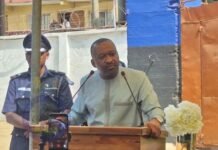By Amin Kef (Ranger)
Last year, the Government of Sierra Leone signed a significant Memorandum of Understanding (MoU) with China Road and Bridge Corporation and the architectural firm Atépa Group, marking a major step toward the construction of the much-anticipated Freetown-Lungi Bridge. The agreement, which was signed in Freetown, aims to begin construction by the final quarter of 2024, with an estimated completion time of three years.
However, as the months pass and December approaches, concerned citizens are questioning whether the project will move forward as planned or remain an ambitious, unfulfilled promise. Public curiosity and concern are growing as Sierra Leoneans eagerly await visible progress on what is considered a transformative infrastructure project.
The proposed 8-kilometer bridge, expected to cost $1.5 billion, is envisioned as a cornerstone of President Julius Maada Bio’s “Big 5” agenda, which prioritizes infrastructure and technological development.
The bridge would connect Freetown, the nation’s bustling capital, to Lungi, home to Sierra Leone’s newly inaugurated international airport, enhancing the country’s transportation network. The project is expected to significantly ease the movement of both international and domestic travelers and contribute to Sierra Leone’s broader economic growth.
The bridge will be a vital link between Freetown and the state-of-the-art Lungi International Airport, which was commissioned by President Maada Bio on March 3, 2023. The airport, replacing the old structure that was built in 1945, was constructed at a cost of $270 million, representing a major upgrade for the country’s aviation infrastructure. The addition of the Freetown-Lungi Bridge would further elevate Sierra Leone’s status as a more accessible destination for international travelers, potentially boosting tourism, trade and investment.
China Road and Bridge Corporation (CRBC), a global leader in infrastructure development, is said to be tasked with overseeing the bridge’s construction. CRBC operates in more than 50 countries across Asia, Africa, Europe and the Americas, and ranks 61st on the Fortune 500 list. With such a vast track record of successful projects, the corporation’s involvement will add a level of credibility to the undertaking. CRBC has been responsible for some of the most challenging and complex infrastructure projects worldwide and their participation in the Freetown-Lungi Bridge project could be seen as a positive indicator of the project’s potential.
In addition to CRBC, the Atépa Group, known for its architectural expertise, is said to be involved in the project. The firm has worked on numerous high-profile projects across West Africa, including the Banjul Airport in Gambia, the BCEAO headquarters in Dakar, Senegal and the ECOWAS Fund headquarters in Lomé, Togo. Their involvement will bring further optimism for the design and execution of the bridge.
The strategic importance of the Freetown-Lungi Bridge cannot be overstated. It is expected to bolster Sierra Leone’s vision for sustainable growth and global connectivity, positioning the nation as a key player in regional transportation. Moreover, the bridge could reduce travel time between Freetown and Lungi from hours, depending on ferry schedules, to mere minutes, offering convenience to business travelers, tourists and locals alike.
Yet, despite the potential benefits, skepticism remains among the population. Many are asking whether the construction of the bridge will actually materialize or if it will remain an elusive dream. The bridge has long been discussed and while the signing of the MoU marks progress, citizens are wary of delays or setbacks that could derail the project. The significant financial cost, coupled with the logistical challenges of such a large-scale project, also contributes to doubts about the Government’s ability to deliver on this ambitious promise.
With construction scheduled to begin in late 2024, all eyes will be on the Government to see if they can meet this deadline and begin the transformative project. The Freetown-Lungi Bridge stands as a symbol of Sierra Leone’s aspirations for modernization and connectivity, but whether it will become a reality or remain a lofty vision is yet to be seen.
As the country moves closer to the proposed start date, citizens and stakeholders alike are anxiously awaiting updates and tangible progress, hoping that the bridge will serve as a beacon of development rather than a monument to unrealized potential.




